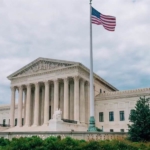The Copyright Act permits registration of original works of authorship with the United States Copyright Office. Copyright registration is not required, however, because a protectable copyright arises once the work is fixed in a tangible medium of expression. That being said, registration is a prerequisite to bringing a lawsuit for infringement. There has long existed a split among federal courts as to whether an application for registration pending satisfies this rule. Earlier this week, the Supreme Court agreed to hear a case deciding this long-disputed issue.
Fourth Estate Public Benefit Corporation v. Wall-Street.com, LLC, an appeal from the Eleventh Circuit Court of Appeals, involves an online news producer that licensed some of its articles to a news website, Wall-Street.com, requiring Wall-Street.com to remove any of Fourth Estate’s articles once the license expired. When Wall-Street.com refused, Fourth Estate brought a copyright infringement claim. In response, Wall-Street.com countered that the Copyright Act only permits infringement suits after the Copyright Office has approved registration of the application.
Some states follow the “registration” approach wherein a copyright owner must have an issued copyright certificate or a rejection by the Copyright Office of its application. Other circuits, including the Ninth Circuit, follow the “application” approach which merely requires completion and filing of an application with the Copyright Office. Actual registration of a copyright can take months after the initial filing unless the applicant pays a hefty expedited fee in cases of “compelling need,” under which prospective litigation qualifies. Overall, the Court’s decision should provide much-needed clarity and uniformity in copyright litigation in that copyright owners will more clearly understand what is required before bringing a claim.

